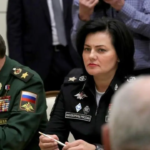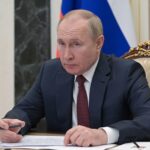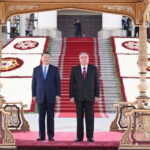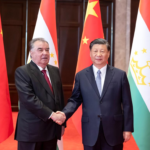Berlin/Singapore (1/3 – 38.46).
Russian propagandists have published a recording of a “conversation between four senior German officers”. In it, they discuss the possible supply of Taurus cruise missiles to Ukraine. The recording is authentic, the Bundeswehr has since confirmed. “This is a very serious matter and that is why it is now the subject of a very meticulous, in-depth and rapid investigation,” German Chancellor Olaf Scholz said.
On Friday afternoon, a half-hour recording of the conversation, which reportedly dates to Monday, Feb. 19, circulated on Russian propaganda channels. Margarita Simonyan, the head of Russia’s state broadcaster RT, then published the recording. She did not say how she obtained it.
It concerns a meeting that was held between Lieutenant General Ingo Gerhartz and three officers using the platform Webex for videoconferencing (!), writes ‘Die Welt’. During the conversation in Singapore, the four senior officers could be heard discussing the theoretical possibilities of deploying German Taurus missiles, apparently in preparation for a briefing to the German government. They talk about the challenges that a delivery of such missiles to Ukraine entails.
Scholz
The four officers do not assume that German soldiers should necessarily be sent to Ukraine for this. However, this is exactly what Chancellor Olaf Scholz has repeatedly used as a reason for not supplying Taurus missiles to Ukraine. According to him, Germany would thus be dragged into the conflict.
The officers also talk about the training of Ukrainian pilots and share technical details about missile systems. They also discuss several targets that the Ukrainians could attack with the Taurus – including ammunition depots and the Kerch Bridge (or Crimean Bridge), a key supply route for Russia-occupied Crimea.
What would make the publication of the recording even more painful for Berlin is that the participants in the call also discuss details about deliveries of Scalp long-range missiles by France and the United Kingdom.
“If this story is true, then this would be a highly problematic incident,” Konstanin van Notz, chairman of the parliamentary committee that monitors the secret services, told the newspapers of the RND group.
Singapore
It’s unclear how the Russians got the shot. One of the officers taking part in the interview is staying in a hotel in Singapore at the time. It is conceivable that he was bugged there, that his phone was compromised or that he dialed in via an unsecured Wi-Fi network.
Given that it was Russian propagandists who sent the audio recording into the ether, it seems obvious that Russian secret services are behind it.
German Chancellor Scholz promises quick clarification on the Russian publication of a recording of a conversation among German air force officers about support for Ukraine. “This is a very serious matter and that is why it is now the subject of a very meticulous, in-depth and rapid investigation,” he said after an audience with Pope Francis at the Vatican.
Damage Mitigation
The Bundeswehr tried to limit the damage on Friday by blocking accounts on X that distributed the recording in Germany.
The German Ministry of Defense is investigating whether the communications of the air force are being tapped by the Russians. “The German Military Counterintelligence Service (BAMAD) has initiated all necessary measures,” a ministry spokesman said.
The question of how secure the Bundeswehr’s internal communications are via unencrypted platforms such as Webex may be raised now that the audio recording has been found to be authentic. It is also possible that other communications were intercepted by the Russians.
The Russian Foreign Ministry had requested a statement from the German government, following the reports about the conversation. “Attempts to avoid answers will be interpreted as an admission of guilt,” said Maria Zakharova, the spokeswoman for the Russian ministry.
Source : DPG Media
















